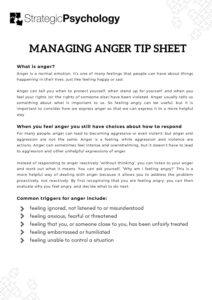
Managing Anger Tip Sheet
1 MB
What is anger?
Anger is a normal emotion. It’s one of many feelings that people can have about things happening in their lives, just like feeling happy or sad.
Anger can tell you when to protect yourself, when stand up for yourself, and when you feel your rights (or the rights of someone else) have been violated. Anger usually tells us something about what is important to us. So feeling angry can be useful, but it is important to consider how we express anger so that we can express it in a more helpful way.
When you feel anger you still have choices about how to respond
For many people, anger can lead to becoming aggressive or even violent, but anger and aggression are not the same. Anger is a feeling, while aggression and violence are actions. Anger can sometimes feel intense and overwhelming, but it doesn’t have to lead to aggression and other unhelpful expressions of anger.
Instead of responding to anger reactively “without thinking”, you can listen to your anger and work out what it means. You can ask yourself, “Why am I feeling angry?” This is a more helpful way of dealing with anger because it allows you to address the problem proactively, not reactively. By first recognising that you are feeling angry, you can then evaluate why you feel angry, and decide what to do next.
Common triggers for anger include:
- Feeling ignored, not listened to or misunderstood
- Feeling anxious, fearful or threatened
- Feeling that you, or someone close to you, has been unfairly treated
- Feeling embarrassed or humiliated
- Feeling unable to control a situation
The following are three steps you can take to manage your anger more effectively.
Step 1: Recognise that you are beginning to feel angry, and give yourself time to think
- Learn to notice the signs in your body that you are feeling angry. These might be clenched fists or gritted teeth, feeling hot, a tight feeling in the stomach, or your heart beating faster.
- If you are tense then you can try to relax by taking a few deep breaths, or tense and release some of your muscles. Try to slow down your breathing. Dealing with your body’s reactions to anger can help to calm your emotions and find a better solution.
- Some people find that temporarily distracting themselves can help – for example you could count to ten slowly. This gives you time to think, and might stop you saying or doing something you will regret.
- If you think you might act in a way that will make the situation worse, sometimes the best option is to walk away from the situation and until you have calmed down.
- Remember that it is normal and okay to be angry, but allow yourself to slow down the process and think through what you want to do before you act.
Step 2: Work out why you are feeling angry
- What has made you feel angry?
- Did someone do or say something that upset you?
- Are there other feelings like fear, embarrassment or sadness that might affect the way you are responding?
- Is the situation something that you can change, or is it something you can only accept and learn to manage?
- Is this the real reason you are angry? Or are there other reasons – like unpleasant memories of similar situations?
Step 3: What will I do to manage this situation?
- Consider how you can deal with the difficulty.
- What are your options? Which would be most effective?
- Could it be useful look at the situation from another person’s point of view?
- Would it be helpful to explain to someone how you feel about the situation?
- What do you want to happen next? Is this reasonable, or is a compromise more likely to work?
- Can you deal with this problem by directly going after what you want, while being respectful to the other people concerned?
If you think your anger is turning into aggression too often, then you might need to do something different. Here are some hints:
- Notice if there is a pattern to what triggers your anger – there may be a problematic factor in your life, such as a relationship issue or mistreatment at work, that may benefit from your attention to try to address.
- You may not be taking adequate time for yourself, your own interests and health. Often people who feel overwhelmed, underappreciated or lacking resources find it more difficult to manage their frustration.
- Be aware that use of alcohol and illicit drugs can contribute to aggressive behaviour. If this is something you are engaging with frequently then this may be contributing to your anger management difficulties.
- Acknowledge when you might benefit from professional support, and seek it out.
Would you benefit from support or assistance?
- Friends, family, or trusted colleagues might have ideas about how to manage your anger. Talking with them can be a helpful place to start.
- If you are getting angry more often than in the past, or if it is starting to be a problem, talking to a health professional such as your GP or a psychologist can help.